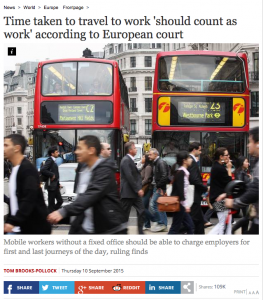In less than a month I will return to Bosnia and Herzegovina (for the second time in two months) to address the Conference on Education, Culture, and Identity in Sarajevo. This year the conference is tackling “New Trends and Challenges of Today’s Europe.” My paper, written well before the refugee crisis, is titled “The Rise and Fall of the European Dream.” I am told that it, along with the other conference papers, will be published sometime later this Winter.
 For “Today’s Europe” a month is an awfully long time. In a month Greece has reelected Alexis Tsipras and Syriza. In a month the Turkish conflict on its southern boarder has reignited. In a month Hungary has shipped fleeing refugees to internment camps and is erecting US border-like fences to keep non-Hungarians out. And just today four EU nations — Hungary, the Czech Republic, Slovakia, and Romania — have elected to line-veto member states’ obligations to provide humanitarian aid, assistance, and refuge for refugees fleeing from hardship.
For “Today’s Europe” a month is an awfully long time. In a month Greece has reelected Alexis Tsipras and Syriza. In a month the Turkish conflict on its southern boarder has reignited. In a month Hungary has shipped fleeing refugees to internment camps and is erecting US border-like fences to keep non-Hungarians out. And just today four EU nations — Hungary, the Czech Republic, Slovakia, and Romania — have elected to line-veto member states’ obligations to provide humanitarian aid, assistance, and refuge for refugees fleeing from hardship.
I would be the last to suggest that sovereign states are obligated to renounce their right to control their borders. However, that is not what is at issue here. At issue is the declining capacity of any nation or group of nations to check the expanding circle of social, political, and economic chaos taking shape just beyond the edge of their political boundaries. A half-century earlier, the US would have stepped in — as it did in post-War Japan, Europe, and Yugoslavia — and paid whatever price was necessary to guarantee the restoration of industrial capacity, markets, trade and economic growth. Policy makers in the 1940s recognized that social and economic disorder invited precisely the kind of political disasters and human terrors that pocked Europe’s landscape in the 1930s, leading them to endorse and financially back strong public institutions and a broad social franchise. And back then the US could do that. So bloated was the US economy — the only remaining industrial economy following the war — and so desperate were investors to find homes into which they could shovel their excess capital that it scarcely mattered where or into what assets investors dumped their cash.
But, of course, it did matter. In France, Italy, as well as Franco’s Spain, the threats of political extremism were fresh indeed. And in the not unreasonable wisdom of the political science of the day nothing put more of a damper on political extremism than strong public institutions and economic growth. So, the US set to work taming Yugoslavia’s Josip Broz Tito and so pumping western Europeans with the dreams of economic growth and unending consumption that political extremists were left with no alternative but to give in.
That was then. This is now. Everyone knows how to mend the seam that has opened up from the Baltics to the Balkans and from the Balkans to western China. Everyone knows upon what ethno-religious nationalism and political extremism feed. There is no mystery here. Yet, if we take stock of the resources and political muscle needed to arrest this great unraveling and mend the gaping tear that has opened up in the body politic, we quickly understand why and how the situation has gotten so desperate.
Notwithstanding the recent lessons of World Wars I and II, notwithstanding the Great Depression, Nazi death camps, and Soviet totalitarianism, economists and political leaders in the US were coming to believe that the post-War boom was unlike any other in history, that it was produced not by the complete destruction of German and Japanese industrial capacity or the largest government-sponsored industrial growth in world history, but was instead an outgrowth of American know-how, stick-to-it-edness, and good old free enterprise. When therefore the economy began to sour in the late 1960s, political leaders and economists were inclined to feel that the 5-6% returns investors had enjoyed counted for something like a birth right. And to prove themselves justified in this conceit they began cannibalizing the very institutional and regulatory foundations that had allowed families in the 1950s and 1960s to buy homes, send their children to good colleges, enjoy reasonably good health care, and expand their leisure time. More importantly, they began to shift the regulatory burden off the shoulders of investors and onto the shoulders of working families by dramatically reducing or eliminating private responsibilities for public institutions.
This shift in regulatory burdens from private investors to working families — families increasingly ill-equipped to handle these burdens — proved immensely popular in the 1980s. So popular that it became the model for newly liberated countries emerging from under the heel of Soviet domination. Deregulation and privatization continued apace during the Clinton years, draining oceans of capital from labor-intensive industrial production into the waiting and open arms of high-return speculative financial markets.
No one seemed to be the least concerned that in this regulatory shift, first the US and Great Britain and then the rest of western Europe were eliminating the very institutional foundations necessary to address the kinds of social and political upheavals that inevitably accompany economic hardship. Now that it is finally dawning on at least some Europeans precisely what is needed to arrest the great unraveling, the EU is being forced to face the political fallout from growing economic hardship, particularly among its Eastern European members: ethno-religious nationalism and political extremism. But the world is also just now learning how little appreciation there is among electorates in core western European nations — France, Great Britain, Germany — not to mention in the US for the intimate relationship between a broad social and economic franchise and the kind of institutional and political stability we now so desperately need in Eastern Europe and along the eastern and southern Mediterranean rim. Electorates are therefore hard pressed to understand why they should be willing to share the cost for extending a social or economic franchise to individuals elsewhere which their own political leaders have not been willing to provide for their own publics. Thus Greece.
What would it take to change this political climate? What would it take to reverse the trend toward ethno-religious nationalism? Part of the answer must come from the economic and political elites within the unraveling nations themselves. But they cannot shoulder the burden alone. Economic and political actors in the EU and the US need to acknowledge that the policy of deregulation and privatization was ill-conceived, that it was based upon a fundamental misunderstanding of the post-War economic boom of the 1950s and 1960s. They also need to acknowledge that public outlays for education, health, and welfare are necessary not to equalize fortunes, at least not solely or primarily; but are necessary to create political and social stability. This was the hard lesson of the 1930s and 1940s. But it is a lesson that evidently was never fully learned and was all too easy to forget. Here the Randian game being played out in full view within the Republic Party leadership in the US is not simply economically infantile. It is dangerous. The business community in the US needs to take a cold hard look at the 1930s and see something more than the handsome returns made by rent-seekers who, on the backs of world war, saw the value of their assets soar.
And what if we fail to learn this lesson? Just look at “today’s Europe.” Which is why in less than a month I am returning, again, to Sarajevo for the second time in less than two months, where in 1914 it all began.



